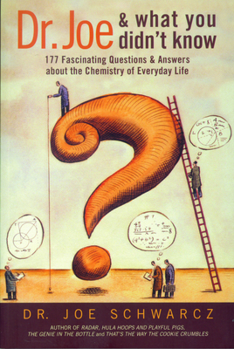Dr. Joe and What You Didn't Know: 177 Fascinating Questions & Answers about the Chemistry of Everyday Life
Select Format
Select Condition 
Book Overview
The mythbuster and bestselling popular science author of A Grain of Salt tackles questions that show the scientific underpinnings of our culture "A book with an incredibly high 'Did you know that. . . ?' quotient . . . Completely captivating." -- New Brunswick Reader Dr. Joe & What You Didn't Know acts as both the source and satiation of scientific curiosity through a series of 177 chemistry-related questions and answers designed to both inform and entertain. From the esoteric to the everyday, the topics Dr. Joe Schwarcz tackles range from Beethoven's connection to plumbing to why rotten eggs smell like rotten eggs. How did a sheep, a duck, and a rooster usher in the age of air travel? What does Miss Piggy have to do with the World Cup? And is there really any danger in eating green potatoes? The answers to these whimsical questions and more are revealed in this collection in an accessible scientific fashion. "Only Dr. Joe can turn the world's most fascinating questions into a compelling journey through the great scientific mysteries of everyday life." -- Paul Lewis, former president and general manager, Discovery Channel
Format:Paperback
Language:English
ISBN:1550225774
ISBN13:9781550225778
Release Date:October 2003
Publisher:ECW Press
Length:241 Pages
Weight:0.80 lbs.
Dimensions:0.6" x 5.6" x 8.3"
Customer Reviews
1 rating
Dr. Joe has the answers!
Published by Thriftbooks.com User , 19 years ago
The "Dr. Joe" books are all very readable, interesting, informative, and bring some much-needed scientific rigour to the realm of "popular science." As a chemistry professor at McGill University, one of Canada's most prestigeous schools, Schwarcz brings a couple decades worth of authority to his books. That's not to say that they are dry and simply factual - they are extremely user friendly and require no science background to understand. That is the genius of Dr. Joe's books - they are easy to read but never scientifically wrong. This particular book contains a number of short (usually ~1 page long) questions and answers on everything from the origin of the green colour in potato chips to the use of dirt in treating tuberculosis. With 177 short essays, there is something to interest everyone. Unfortunately, they are numbered 1-177 and proceed with no other subdivisions. While this makes it easy to read in short bursts (it's ideal for city bus rides, for example), the book lacks cohesion. There are some interrelated questions that are separated in the book, when links between them would help the explanation of each observation. What he loses in coherence, however, he makes back up in variety. In short, this is a fun book for anyone interested in how the physical world works. It also contains a number of ideas for science fair projects, for example, and so could become a valuable reference in addition to an interesting read.






